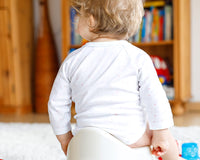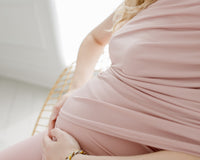One in three women who have had a baby experience leakage at some point. More than a third of women experience involuntary urinary leakages during the second and third trimester, and a third of women experience incontinence during the first three months after delivery. In most cases it is a short-term side effect but, unfortunately, it can be more long-term for some women.
What causes urinary incontinence during the pregnancy?
When a woman is pregnant, the transformation of their body goes through many changes.- Your baby takes up a lot of space, which increases weight and puts pressure on the abdominal and pelvic floor muscles.
- The uterus (situated over the bladder) grows, leaving less room for the bladder to expand. So even if you have a minimal amount of urine it creates the urge to urinate frequently.
- Your body generates hormones that stretch muscles, tissues, the bladder, the bowel and the uterus (the pelvic floor).
All these factors make the muscles that control your bladder weaker, which increase the chance of leaks.
Women who have a cesarean can also develop bladder problems. The risk of having incontinence reduces from 10% to 5% for the first baby, but after the third cesarean, the risk is back to the same amount as women who have a vaginal birth.
Tips to fight stress urinary incontinence during pregnancy:
There are some simple steps you can take during pregnancy to help prevent SUI:- Have a healthy weight
- Avoid constipation as this strains pelvic floor muscles
- Eat a high fibre diet, including fruit, vegetables and cereals
- Avoid drinks that contain sugar and caffeine as these can irritate the bladder
- Drink plenty of water and stay hydrated
- Practise prepartum exercises to stimulate the muscles
- Take care of your pelvic floor by doing regular pelvic floor exercises
- Frequent urination (go to the toilet as many times as you need)
- Exercise for at least 30 minutes every day. Always exercise safely during and after pregnancy. Some good exercises can be walking, water aerobics, swimming, pilates, yoga, light weight training etc.
Urinary Incontinence after pregnancy
In the first days after delivery, SUI is very common, however if it persists it must be treated. Whether you have a cesarean or natural childbirth, the duration of incontinence cannot be known exactly. Generally, incontinence after delivery can be resolved in a few months, excluding some cases where it may not disappear and even get worse. On some occasions, it may disappear after delivery but may return again during subsequent births.After birth, it is important to give time for your pelvic floor to recover:
- Ice the perineal area and have plenty of rest
- Start with gentle pelvic floor exercises when you are lying down
- Make changes to your lifestyle e.g. losing your pregnancy weight, eating fibre and drinking water
How is urinary Incontinence treated?
Treatment will depend on what kind of incontinence you have and how severe it is. It is best to go to a specialist to guide you in the best way to be treated. Some ways to manage:- Pelvic floor exercises
- Bladder training
- Medication
- Surgery procedures
For now until you can get treatment, we have you covered! Our women's collection includes washable & reusable, leak-proof incontinence pants, underwear and pads for both light and heavy leakage. Each product is specially designed for the female anatomy to ensure the most comfortable and secure protection against urinary and faecal (fecal) incontinence. Because we want you to feel confident wherever you go!
Urinary incontinence not only affects your physical health but also your emotional health and wellbeing, which can be linked to birth trauma. If you are having any concerns or are experiencing anxiety or depression, it is best to talk to a specialist or friend and remember, you are not alone! To get support, call the National Continence helpline at 1800 33 00 66, a free telephone service that offers confidential information, advice and support.
Sources:
Pregnancy birth & baby, Continence Foundation of Australia
Disclaimer: No content on this website, or in this article, regardless of date, should ever be used as a substitute for direct medical advice from your doctor or other qualified clinician.
If you have any question never hesitate to contact us! - THERE’S NO SUCH THING AS A SILLY QUESTION!
Web: https://nightnday.com.au
Email: gday@nightnday.com.au
Australia: (02) 9531 2011
International: +61 2 9531 2011









